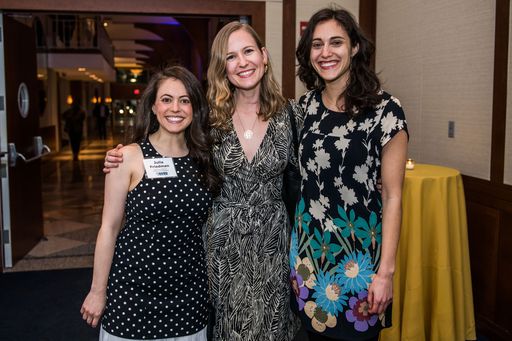Our GOSO Transformer of the Month series continues, recognizing individuals from our community who are working to create a more equitable and vibrant world. We are honored and privileged to call Rachel Bloom one of GOSO’s Action Board members. Rachel lives in Brooklyn and works as a Clinical Psychologist. She recently started her own private practice last year and is the newly appointed head of the Programming Committee of GOSO’s Action Board.
How did you get involved with GOSO and its Action Board?
I started volunteering with GOSO in 2013. The specific focus on emotional well-being as one of GOSO’s three core tenets to reduce recidivism encouraged my participation. I felt a huge area of alignment as a mental health provider. I began with the mentorship program, and have been grateful for other

Rachel Bloom and staff at the GOSO Annual Gala.
opportunities since then, as connecting with the GOSO volunteers and staff is always meaningful and impactful. I was excited when I was invited to join the A.B. and further my connection with GOSO. It has been incredible to witness GOSO continue to grow and flourish, and I am grateful to be able to participate in its impact.
How do you work to be inclusive and work towards a more equitable society for all?
It is important to me to be mindful of moments in which I have more power due to my privileges and use it to accelerate change. I aim to maintain awareness of the impact of race, power, and privilege, and how they intersect in any situation I am in. I attempt to be in a place of continuous learning, experience, and acknowledgement of blind spots due to my privileges. This can be through counter-storytelling in a moment when a white culture assumption is present in my field of work or taking accountability for when I am colluding with an inequitable system. I aim to push the boundaries of what is comfortable within white supremacist culture to change current norms of racial inequity.
What does justice transformation mean to you?
From my current lens, justice transformation would require a shared understanding that racism and white supremacy are foundational elements to current policing and incarcerating. Reparations and systemic change are essential. Justice transformation means communities being supported and receiving mental health services during a crisis. Justice transformation means equity, where all communities are subject to the same involvement of law enforcement. This will require the privileged to acknowledge and take accountability for current privileges. We all need to use our privileges responsibly. This includes being active and thoughtful about the information we engage with, the institutions we support, and the voices we amplify, to promote racial equity within the justice system.
How do you feel society can move past the stigmas of incarceration?
Stigmas are unfortunately powerful by making the stigmatized appear as an other, different or at its most extreme, inhuman. I think many of us with privileges stay in the safety of thinking that those who are incarcerated are other or different, providing a false safety that our unjust incarceration system may not be our shared problem, and an issue we all must face together. We need to take steps to ensure all members of our country are aware that many of the factors leading to incarceration have to do with lack of privileges, and are therefore often out of the control of the incarcerated population; namely: race, class, and mental health status. We need to increase connection between those who are incarcerated and those who are not, to decrease “othering” of the incarcerated person, to erode biases over time, and increase the humanity that exists within every person.
May is Mental Health Awareness Month, after such a tumultuous year and more uncertainty on the horizon, how should we be centering and caring for the mental health of those most vulnerable to justice involvement and violence in their communities?
It is a heartbreaking truth that many who are incarcerated are struggling with their mental health. Although I cannot speak definitively about what type of support is best for someone else, I can relay the unfortunate reality that access to mental health service is a privilege in our society. So much of our mental health comes from stability, safety – core needs being met, whether it be emotional needs, housing or job security. Creating an environment where each person has agency to take action against instability, unsafety, or stress, rather than feeling alone or without choices, is an integral first step. Increasing awareness of the benefits of mental health services, and accessibility to mental health resources is another goal to strive for. Our mental health is impacted by our privilege. In the provision of mental health services, working to acknowledge the disparities of privilege between therapist and client is core to promoting safety and balance.
How do you counter feelings of burnout while keeping in mind your activism and sense of responsibility?
It feels important to name that I hold the privilege of daily safety and security, which allows me to participate and take action when I’m able, and also care for myself as needed. I am grateful to stay connected to missions that are meaningful to me, that allow me to participate in working towards the type of country I want to live in. I think we can all feel a sense of urgency due to the gravity of what is problematic in our country. Any time a feeling of urgency overwhelms, that is the time to slow down and switch gears. A sense of urgency is usually a sign to instead take it slow, get grounded, rebalance, and then reconnect.

